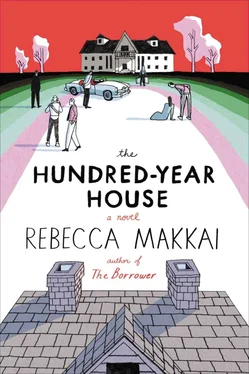He counted natives by the score
He cried, “Exploring’s such a bore
When all of it’s been found before!”
Ohhhh — I tell you, gentle philosophers,
In these modernest of times
That history doesn’t repeat…
It merely rhymes!
There were so many layers of insulation to this one room. The leather-bound books, and then their shelves, and the walls themselves, and the outer bricks, and then the blanket of ivy that could swallow your whole hand, up to your wrist. And then the thick summer air, and the groves of mismatched trees — the legacy, apparently, of Violet Devohr’s insistence on horticultural diversity — and then the stone wall, and then the woods. It should have felt safe, but instead it was smothering and cold at once.
Marlon leaned against a standing Eddie and settled his rear on the back of the davenport, just inches from Marceline’s head. He wore, as usual, his smoking jacket, tied at the waist. He smelled of pomade. He said, “Do you believe in fate?”
“Sure.”
“The moment I saw you, I felt certain I’d seen you before.”
“I’m not sure that’s fate so much as déjà vu.”
“Ah. The French have no imagination.”
Eddie found himself smiling back but ignoring whatever else Marlon said. He watched Armand take a drink to Marceline. Armand dressed like a college boy, argyle sweater and bright argyle socks, knickers. The rumor of the afternoon had it that Marceline had been demoted from a lead actress at MGM, and sent here at the mercy of Mr. Mayer to try her hand at writing, to rework two old silent scripts into talkies. Her exquisite looks were fading, the sharp bob doing nothing for her nose, and that accent, it was true, would not go over now. Everyone was dying to ask about films, to ask if she knew Gary Cooper. Eddie heard her say to Armand, “You should go right now to Berlin. There are in Berlin the most vonderful pansy clubs.”
In the corner, Zilla and Viktor, ignoring each other.
Samantha in tweed knickers and green broadcloth blouse, rubbing Ludo’s shoulders, singing along.
Everyone coupling and recoupling around the room in laughter, like a formal dance.
Armand, hands on the White Rabbits’ shoulders, swaying by the piano. His sleeves rolled up, his arms covered in dark golden hairs. The White Rabbits sang the chorus of a new song:
Give me back my kiss,
It wasn’t for you to keep.
Eddie had languished in confusion for a full week before finally asking Zilla why the women were called White Rabbits. But he couldn’t get it out of his head yet that there was some connection to their noses, both small and pink, or to their silvering hair, or to plump Josephine’s buck teeth or wiry Fannie’s quick little eyes.
He realized that behind him, below him, on the davenport, Samantha Mays was crying quietly, and Zilla was comforting her. He had thought of Samantha as the type of woman who didn’t cry. There was something about her that was like a fourteen-year-old boy, all elbows and knees and a broad chin, and he’d always imagined she could fall off a horse and bounce. She said, softly, “But I didn’t imagine he’d written to the board . Oh, I just don’t know. He’s been looking for the slightest justification.”
Zilla’s voice, low: “But we have a room here full of tremendously creative people. I’m sure we can think of something.”
Marlon must have heard it too. He said, “Tell him we have a film star here! That’ll grab his attention!”
Samantha looked up and laughed. “Oh. Oh, Marlon, don’t listen to me. I’ll just worry you. But no, it wouldn’t help. If anything, he’ll use it as proof we’re a bunch of hedonists. We’ll have to clean up. We’ll have to hide Ludo. If anyone asks, Ludo’s been gone two years.”
—
At midnight, it was just Marceline and Armand and Zilla and Eddie. Eddie wanted to be in bed, asleep, but he didn’t want to be alone yet in his little room at the top of the stairs.
Marceline was explaining that Los Angeles was a city without attics. “Vhy vould you need them? Nothing is old there, not a single antique, except the vons brought in for display. And I am myself an antique, of course.”
A clamor of protest.
Eddie had worried she’d be haughty, but he found he enjoyed this woman, the tenacity with which she was determined to move on past the end of her particular, silent art.
“How is the life in Chicago?” she said to Armand. Another thing to admire: the instinct to steer the conversation away from herself.
Though Marceline had asked the question, Armand seemed to address his answer to Eddie. “It’s swell. I’m in Towertown, and really I think it’s better than New York. Everyone interesting in New York is actually in Paris, anyway. But Chicago’s copacetic. And there’s a lot doing for artists. Poets, too. Eddie, do you know Harriet Monroe? I could introduce you. If you were ever in the city. And you ought to be! What does Philadelphia have? You’re out of the loop there. And what life is there, even? For people like us? You ought to be in Towertown or on a boat to Florence.”
Zilla said, “Oh Armie, you made him blush!”
It was true. He was blushing at how easily Armand had read him. At Armand’s ready implications. People like us . But the heat in his face had started before that, at Armand remembering Philadelphia — at his remembering Eddie’s name at all. Eddie had grown used to assuming he was the only one in the room taking note of everything, of everyone’s habits and gestures, squirreling away the details they let fall about their lives. He’d learned long ago to reintroduce himself at least three times to people whose names and drinks and life stories he’d long since memorized. He wondered if the rest of the Chicago crowd was like Armand, like himself — not in the way Armand had meant, but wide-eyed, absorbent.
Eddie struggled for something quick to say, but just then the lamp on the piano crackled, and the room was dunked in blackness. Marceline screamed, and Zilla laughed. “There,” Zilla said. “I don’t know why the Rabbits had to go frightening you about the attic. When clearly the ghost is right here.”
Marlon stands on the wall by the road and aims his Leica at the director’s house, what used to be the coach house back when this was poor, doomed Violet’s estate. Armand Cox leans there, smoking. Alfie sniffs in quick circles nearby. The wall is narrower than Marlon expected, and it takes great effort to balance. He can’t quite focus the lens on Armand, and so he trains it on the giant oak between the houses instead. After the photo but before he can hop down, a voice from out on the sidewalk: “What is that place, anyhow?”
Marlon looks down at the speaker, a young boy with a stick. He says, “It’s an asylum for people who think they’re artists.”
—
Uncaptured by the lens:
Samantha staring from her bedroom window, listening to the calming clatter of Beatrice’s typewriter. Behind her, the smell of something burning. She wonders what on earth could be burning.
Ludo in the composer’s cottage, hitting his head on the piano keys in frustration.
Fannie and Josephine, lying like quotation marks in bed, the afternoon sun on their feet. Fannie tracing the lines of the room from one corner all around to Josephine’s shoulder, thinking about shape as sound, about silence as negative space.
Viktor in the hallway, picking Zilla’s blue earring off the rug and clipping it back to her ear, letting his wrist touch her neck, watching her eyes close. Zilla scrambling like an egg.
The bootlegger, driving slowly up the road, knowing he’ll recognize Laurelfield by the number of autos out front.
Читать дальше












